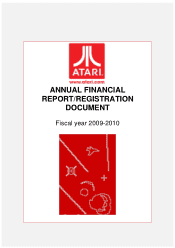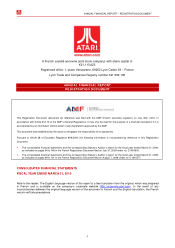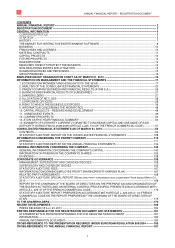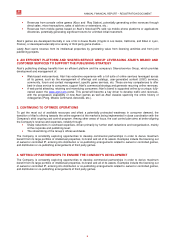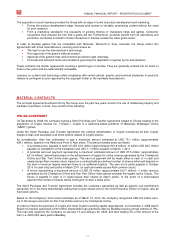Atari 2010 Annual Report Download - page 11
Download and view the complete annual report
Please find page 11 of the 2010 Atari annual report below. You can navigate through the pages in the report by either clicking on the pages listed below, or by using the keyword search tool below to find specific information within the annual report.
ANNUAL FINANCIAL REPORT – REGISTRATION DOCUMENT
11
The acquisition of such licenses provides the Group with an edge in terms of product development and marketing:
• During the product development stage, licenses give access to valuable, preexisting content without the need
for prior research.
• From a marketing standpoint, the popularity of existing themes or characters helps sell games. Consumer
recognition thus reduces the risk that a game will fail. Furthermore, products benefit from all advertising and
promotion conducted on behalf of those characters or themes outside the video game sector.
In order to develop games that are compatible with Nintendo, Microsoft or Sony consoles, the Group enters into
agreements with those manufacturers, covering such issues as:
• The right to use the manufacturer's technology.
• Prior approval of the game's editorial content.
• Approval of the game's final version before production gets underway.
• Financial and technical terms and conditions governing the duplication of games by the manufacturer.
These contracts are master agreements covering a specific type of console. They are generally entered into for terms of
three to five years and are automatically renewable.
Licenses on content and technology entail compliance with certain ethical, graphic and technical standards. A product's
release is contingent on prior approval by the copyright holder or the hardware manufacturer.
MATERIAL CONTRACTS
The principal agreements entered into by the Group over the past two years concern the use of intellectual property and
hardware (consoles). In brief, they consist of the following:
ONLINE AGREEMENT
On December 8, 2008, the Company signed a Stock Purchase and Transfer Agreement subject to US law relating to the
acquisition of Cryptic Studios Inc. (“Cryptic”). Cryptic is a California-based publisher of Massively Multiplayer Online
(“MMO") games.
Under the Stock Purchase and Transfer Agreement the existing shareholders of Cryptic transferred all their Cryptic
shares to Atari and cancelled of all stock options related to Cryptic shares.
As consideration, Atari has undertaken to pay a maximum amount estimated at USD 75.1 million (approximately
€59.1 million), based on the Reference Price of Atari share. This amount breaks down as follows:
• A purchase price, payable in cash of USD 27.6 million (approximately €21.6 million), of which USD 26.5 million
payable on completion of the transaction and USD 1.1 million payable on March 1, 2011.
• A potential earn-out payment representing a maximum estimated amount of USD 27.5 million (approximately
€21.6 million), determined based on the achievement of targets for online revenue generated by the Champions
Online and Star Trek Online video games. This earn-out payment will be made either in cash or in cash and
newly-issued Atari common stock, based on a contractually pre-defined number of shares which will depend on
the level of revenue targets reached (there is no settlement option). The earn-out is partly payable in October
2010 (in cash only) and partly in March 2011 (in cash and newly-issued Atari common stock).
• A bonus representing a maximum amount of USD 20 million (approximately €15.7 million), if online revenue
generated by the Champions Online and Star Trek Online video games exceeds the targets set by Cryptic. The
bonus is payable in cash or in newly-issued Atari shares at Atari’s option. In the event of a share-based
payment the number of shares will be contingent on Atari’s share price.
The Stock Purchase and Transfer Agreement includes the customary warranties as well as specific non-commitment
warranties for (i) the three shareholders selling their Cryptic shares and (ii) the Chief Executive Officer of Cryptic, who all
hold stock options.
Based on the Company’s most recent estimates as of March 31, 2010, the Company recognized USD 9.9 million earn-
out in the Group’s accounts for Star Trek Online and none for Champions Online.
In order to finance the purchase of Cryptic and meet Cryptic’s working capital requirements, on December 3, 2008 Atari’s
Board of Directors authorized a €30 million shareholder loan granted to Atari by BlueBay bearing annual interest of 15%.
This loan was repaid by the Company on January 13 and January 23, 2009, and fees totaling 3% of the amount of the
loan (i.e. €900,000) were paid to BlueBay.

